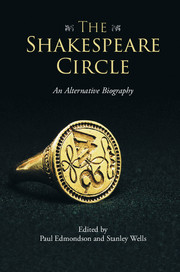Book contents
- Frontmatter
- Contents
- List of illustrations
- List of contributors
- Preface and acknowledgements
- General introduction
- Part I Family
- 1 His Mother Mary Shakespeare
- 2 His father John Shakespeare
- 3 His siblings
- 4 His sister's family: the Harts
- 5 His wife Anne Shakespeare and the Hathaways
- 6 His daughter Susanna Hall
- 7 His son-in-law John Hall
- 8 His son Hamnet Shakespeare
- 9 His daughter Judith and the Quineys
- 10 His granddaughter Lady Elizabeth Barnard
- 11 His ‘cousin’: Thomas Greene
- Part II Friends and Neighbours
- Part III Colleagues and Patrons
- Closing remarks
- Afterword
- Index
- References
10 - His granddaughter Lady Elizabeth Barnard
from Part I - Family
Published online by Cambridge University Press: 05 November 2015
- Frontmatter
- Contents
- List of illustrations
- List of contributors
- Preface and acknowledgements
- General introduction
- Part I Family
- 1 His Mother Mary Shakespeare
- 2 His father John Shakespeare
- 3 His siblings
- 4 His sister's family: the Harts
- 5 His wife Anne Shakespeare and the Hathaways
- 6 His daughter Susanna Hall
- 7 His son-in-law John Hall
- 8 His son Hamnet Shakespeare
- 9 His daughter Judith and the Quineys
- 10 His granddaughter Lady Elizabeth Barnard
- 11 His ‘cousin’: Thomas Greene
- Part II Friends and Neighbours
- Part III Colleagues and Patrons
- Closing remarks
- Afterword
- Index
- References
Summary
In a deed poll of 1653, appointing trustees for property in and around Stratford-upon-Avon, a forty-five-year-old woman referred to her ‘grandfather’. What lifts this mundane business transaction above the ordinary is the fact that the woman was Shakespeare's granddaughter Elizabeth Barnard, née Hall. As quoted in Halliwell's 1848 The Life of William Shakespeare, she refers to properties and land ‘which were sometimes the inheritance of William Shakespeare, gent., my grandfather’ (Halliwell 1848, p. 318). To posterity there is something disarming about the fact that someone once called Shakespeare ‘grandfather’, even if we have known all along that the Shakespeares were domestically no different from any other family in the Midlands of the time.
When Elizabeth Hall was sick, her father, a highly esteemed physician, recorded details of her illness and his cure for her, just as he had done earlier for her mother Susanna, ‘Mrs Hall of Stratford, my wife’, when Susanna was ‘miserably tormented by the colic’ (‘Observation XIX’). Hall's detailed account of his daughter's sickness is of considerable intrinsic interest, not least for including an intriguing date that has rightly exercised the attention of biographers (Lane 1996, p. 34). He records that in early January 1625 (1624 Old-Style, until 1752, when the year ended on Lady Day, 25 March), ‘Elizabeth Hall, my only daughter, was vexed with Tortura Oris, or the convulsion of the mouth’. Elizabeth was then sixteen years old. Her father cured her by administering laxative pills: ‘She took five the first day, which gave her seven stools; the next day with the other five she had five stools and was happily cured.’ At the same time, perhaps related to her facial inflammation, she suffered from an eye infection (‘For an ophthalmia of which she laboured I used our ophthalmic water’) and her periods (‘courses’) were stemmed. Hall dealt with these further afflictions in the same brisk manner so that at the start of April 1625 Elizabeth was well enough to travel to London.
There could be any number of reasons for her wanting to go to London just then, but the death of the King at the end of March 1625 and the accession of Charles I are the most obvious public events to have triggered such a visit.
- Type
- Chapter
- Information
- The Shakespeare CircleAn Alternative Biography, pp. 122 - 134Publisher: Cambridge University PressPrint publication year: 2015
References
- 16
- Cited by

